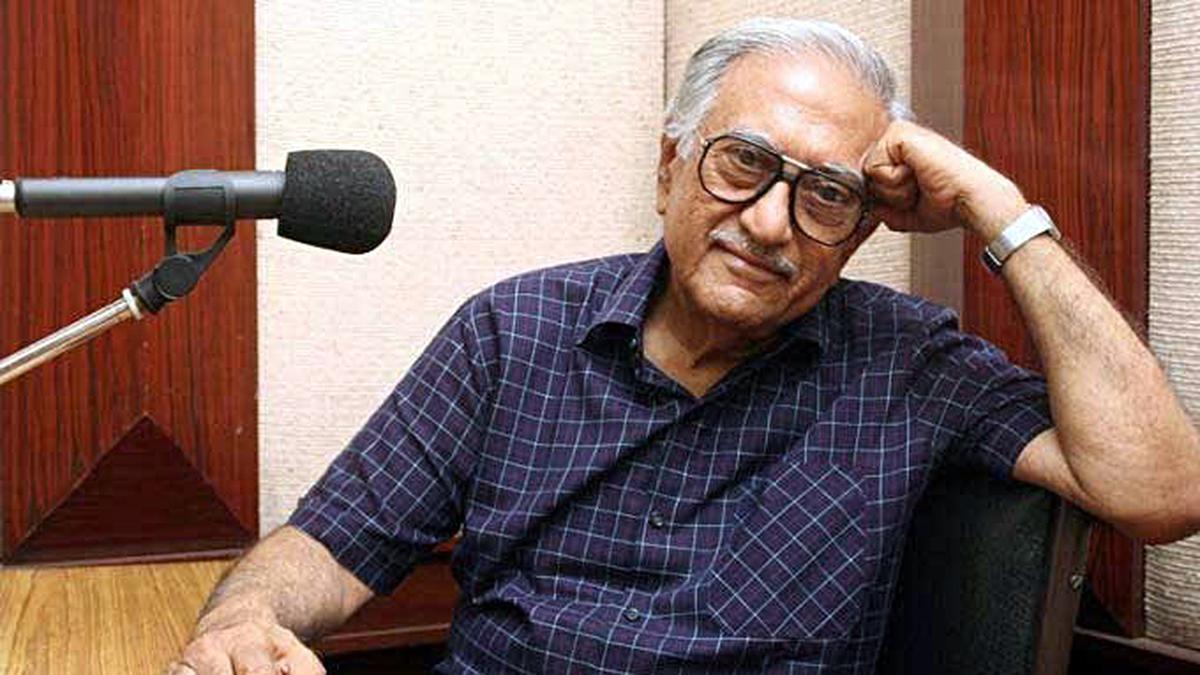
For decades, Ameen Sayani brought music into the homes of millions of radio listeners
The Hindu
Ameen Sayani: The voice that revolutionized Indian broadcasting, leaving behind a legacy of music and memories.
He painted with the spoken word and ended up filling our canvas with rich memories of his mellifluous voice and popular songs of Hindi cinema. A word that dropped off his lips got a life, a lilt, even destiny of its own. Listening to Ameen Sayani, who passed away in Mumbai following a heart attack on Tuesday evening, was like serenading joy. The Binaca Geetmala he hosted with much relish and not a little chutzpah gave millions of weary listeners of first, Radio Ceylon, and then Vividh Bharati, a reason to smile at the end of the day. For a brief while every week, from 1952 to 1994, it seemed there was no sorrow in life, and the music of life itself had an unending rhythm of its own. Until it all came to an end when Sayani, who had been battling age-related issues for a few years, breathed his last at HN Reliance Hospital, leaving his fans speechless.
The tributes came in thick and fast with Prime Minister Narendra Modi tweeting: “Shri Ameen Sayani Ji’s golden voice on the airwaves had a charm and warmth that endeared him to people across generations. Through his work, he played an important role in revolutionising Indian broadcasting and nurtured a very special bond with his listeners.” Devendra Fadnavis, Deputy Chief Minister of Maharashtra, stated, “He had an equally sweet voice as the songs.” Seasoned actor Raza Murad called him “the badshah of radio just like Lata Mangeshkar was the badshah of music”.
The praise was hard-earned. Sayani not only hosted Binaca Geetmala for 42 years, he produced more than 50,000 radio programmes, including the popular Bournvita Quiz Contest and the well-received S. Kumar ka Filmi Muqadma besides Saridon ke Saathi, and managed to transition from radio to television with seamless ease. He composed around 19,000 radio jingles, too. Such was the charm of Sayani that playback singers, music directors and film stars, all wanted their songs to be featured on his countdown show. Once renowned film director Basu Chatterjee wondered aloud what did he have to do for the songs of his films to make it to Binaca Geetmala! His prayers were answered, and the songs of both Chhoti si Baat and Rajnigandha earned repeat slots in Binaca Geetmala in the 1970s.
There is an interesting story behind Binaca Geetmala, and how some 37 years later, it became Cibaca Geetmala with a jingle announcing, “Wohi gun, wohi kaam, Binaca ka sirf badla hai naam” (same values, same work, only Binaca’s name is changed).
Back in the early years of Indian Independence, there was a pronounced effort to promote classical music. The Information and Broadcasting Minister B.V. Keskar did not have much regard or space for Hindi film songs on All India Radio (AIR). With AIR limiting itself to merely 10% for Hindi cinema, Radio Ceylon, then riding waves of popularity, stepped in with its combination of English, Tamil and Hindi music. Sayani was to make his first splash not in what was then Bombay but Ceylon.
It so happened that an American businessman, Daniel Molina, hired Hamid Sayani, Ameen’s elder brother, to run the operations at Radio Ceylon. The elder brother, in turn, brought in his sibling, Ameen, then barely 20, to host a music show. The programme was sponsored by a Swedish company Ciba, the manufacturers of Binaca toothpaste. The name Binaca was prefixed to the ‘Geetmala’. It played popular songs of the week though it would be another couple of years before the countdown started. And Sayani devised a vocabulary all his own.
Added to his easy, conversational style were terms like ‘paydaan’ or rank. He backed it up with information about the songs and little anecdotes about the films. For instance, he told the listeners how it took 16 years to make Mughal-e-Azam, or how Lata Mangeshkar sang the songs of Satyam Shivam Sundaram at one go. Or why Amitabh Bachchan kept his hand in the pocket during a song from Sharaabi. These were little gems only Sayani, who began his programmes with trademark remark, “Behno aur bhaiyo, main hun apka radio dost Ameen Sayani”, could offer.

The girl, who was admitted to Aster CMI Hospital with alarming breathlessness and significant pallor, was diagnosed with Wegener’s Granulomatosis (now known as Granulomatosis with Polyangiitis or GPA), a rare autoimmune condition that causes spontaneous bleeding in the lungs, leading to acute respiratory failure.

ACB files case against IPS officer N. Sanjay in Andhra Pradesh. The official is accused of manipulating the tender processes for awarding contract for development and maintenance of AGNI-NOC portal, and conducting awareness meetings for SC/STs. It is alleged that the total value of properties stolen, or involved in the case is estimated at ₹1,75,86,600.









